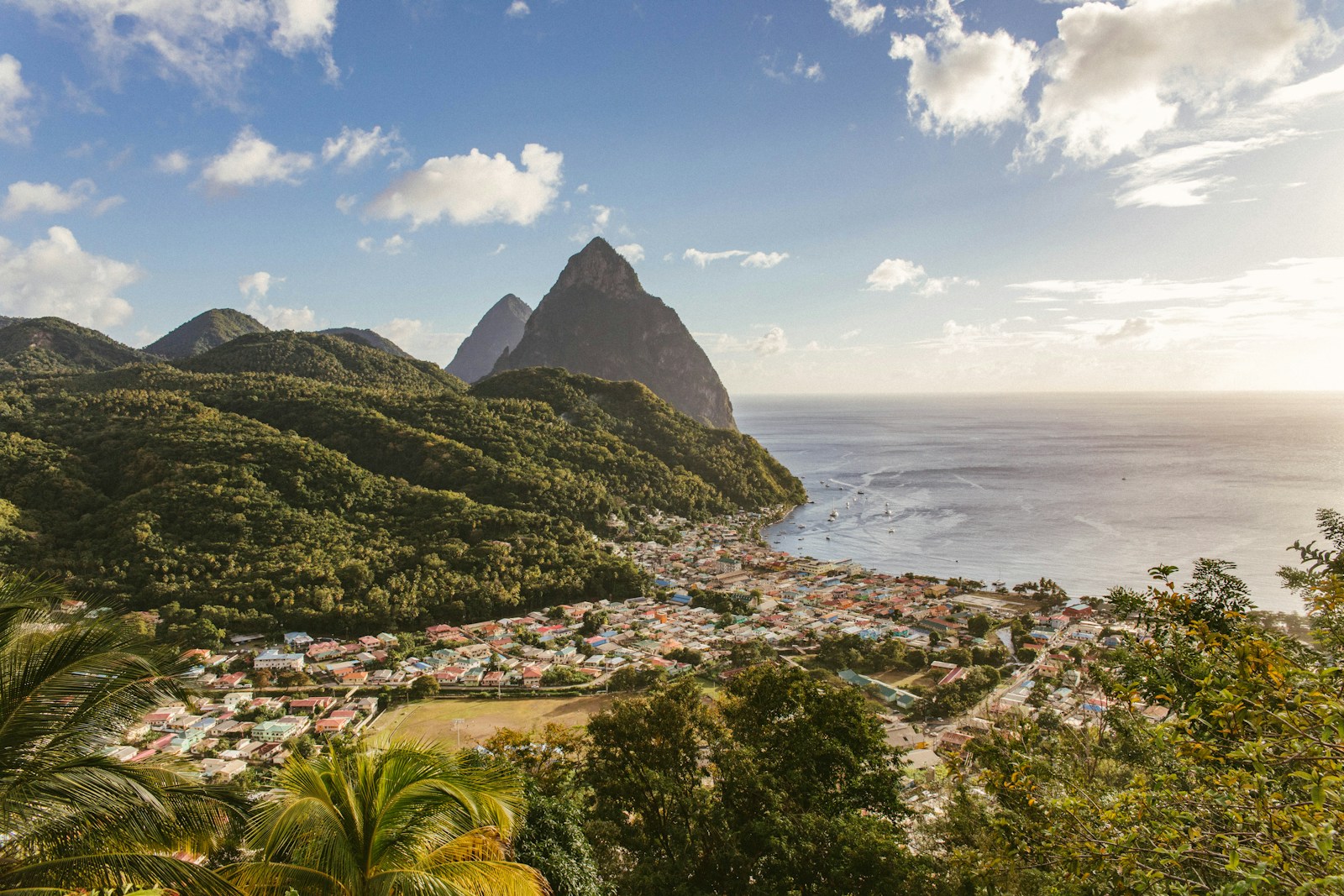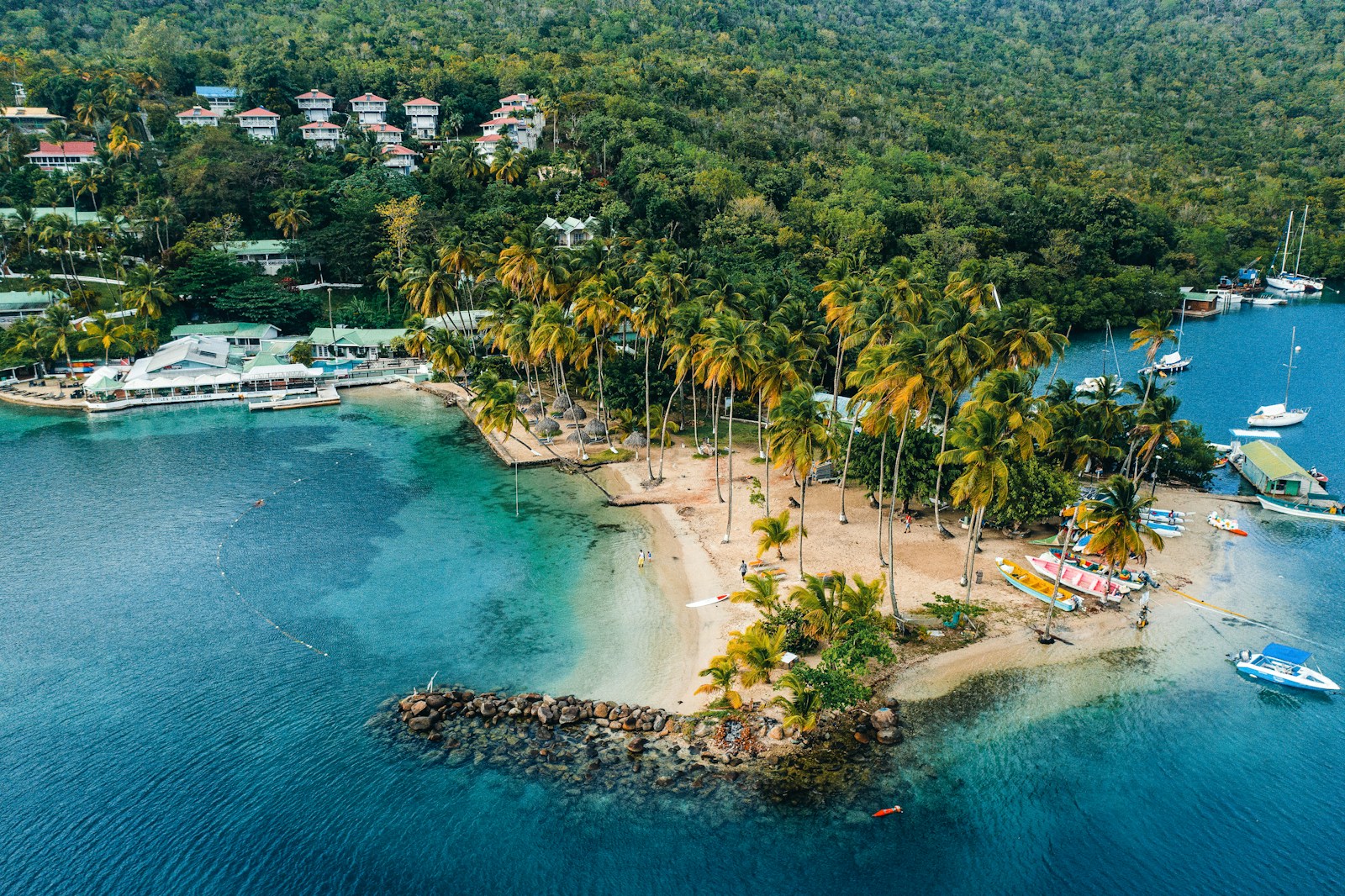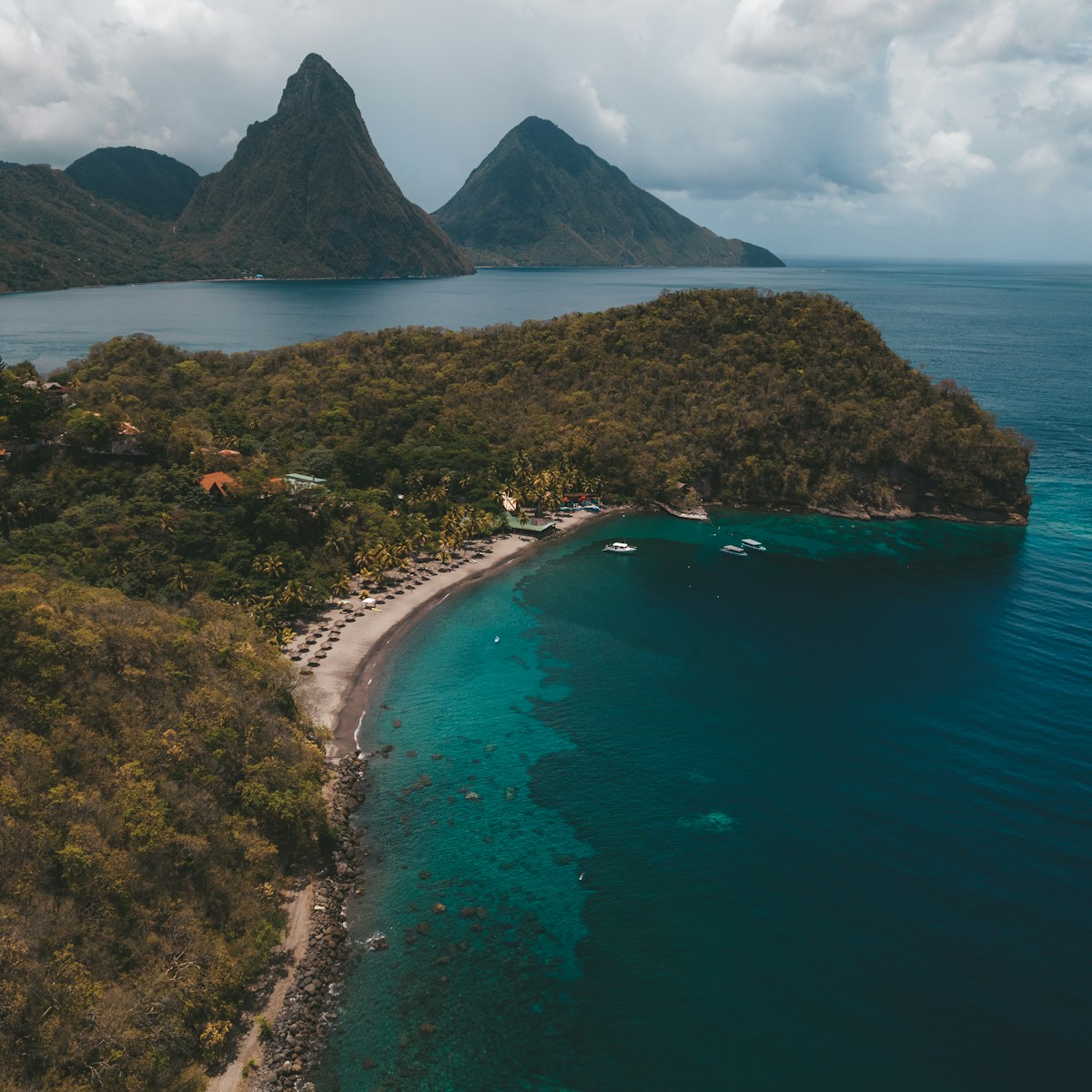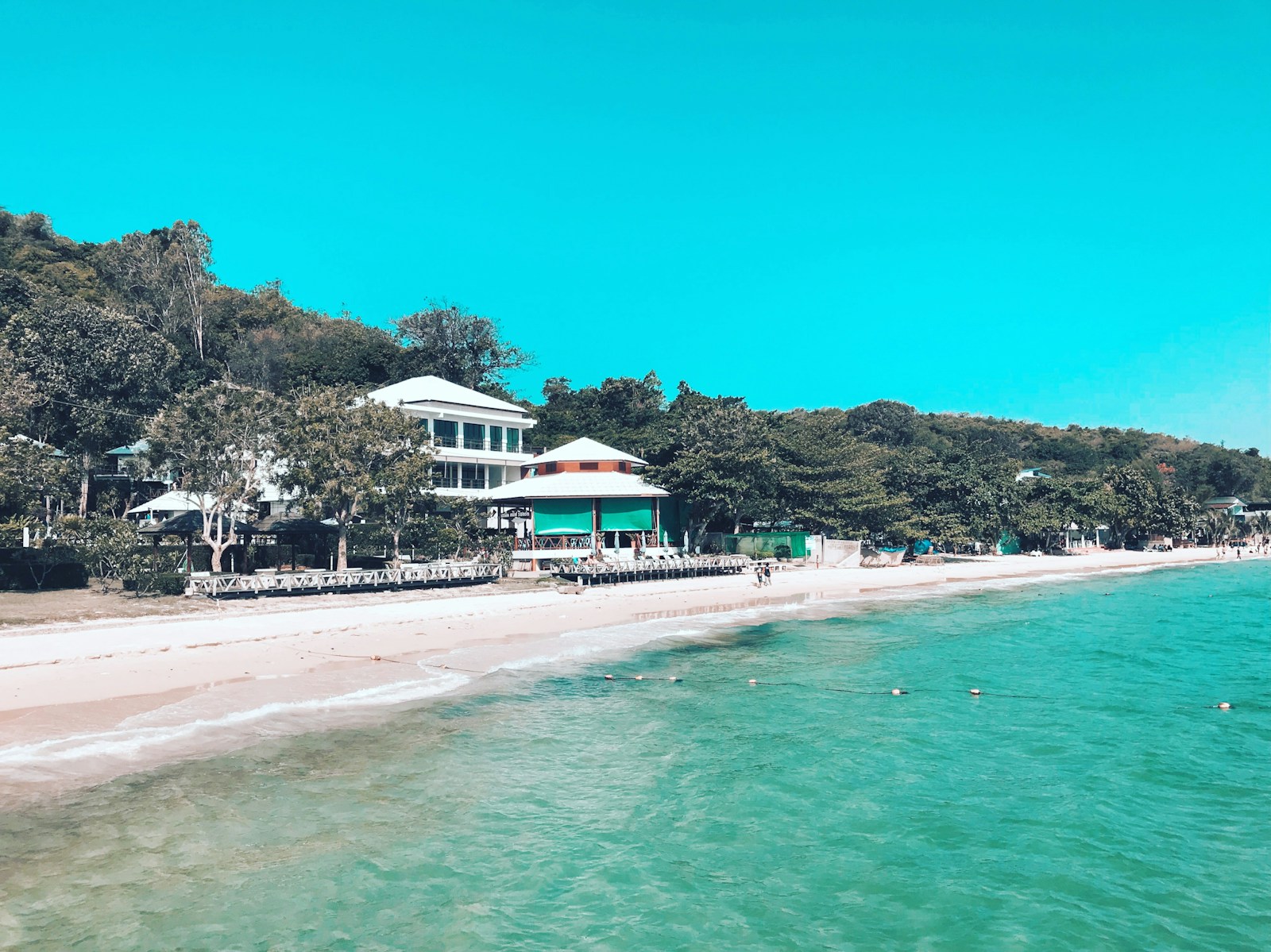You’re probably dreaming about your next tropical escape, and St. Lucia’s on your radar. This Caribbean gem, known for its stunning beaches and lush rainforests, is a paradise for travelers. But you might be asking, “Is St. Lucia safe to visit?”
Safety is always a top concern when planning a trip. It’s natural to wonder about the local crime rates, health risks, or natural disasters. In this article, we’ll delve into the safety aspects of St. Lucia, providing you with the information you need to make an informed decision.
Remember, no destination is 100% safe or dangerous. It’s all about being informed, prepared, and aware. So, let’s get started and explore the safety of St. Lucia.
Is St. Lucia Safe for Travelers?

As a traveler, your safety is paramount. St. Lucia is a relatively safe destination for tourists, yet like anywhere else in the world, there are certain risks involved. So it’s essential to arm yourself with as much information as possible, and that includes understanding the crime statistics and local laws and regulations.
Crime Rates and Statistics in St. Lucia
St. Lucia maintains a relatively low crime rate, especially in areas frequented by tourists. However, petty crimes like pickpocketing or stealing personal belongings do happen occasionally. More serious offenses such as violent crimes are less prevalent but are unfortunately not non-existent either.
Have a look at the crime rate data table below to give you a better sense of the safety level in St. Lucia.
| Crime Type | Number of Incidents (Yearly) |
|---|---|
| Petty Theft | 125 |
| Violent Crime | 45 |
| Drug-Related Crimes | 30 |
Keep in mind that being vigilant and taking precautions can significantly lower your risk of falling victim to these potential crimes.
Local Laws and Regulations to Consider
When visiting any foreign country, it’s vital to be aware of and abide by the local laws and regulations. In St. Lucia, these laws significantly contribute to maintaining safety and order, whether for residents or visitors.
For instance, illegal drug possession is punishable by law in St. Lucia. Beware of local vendors who might approach tourists with drugs or other illegal items for sale.
Also, it’s noted that St. Lucia driving laws and road conditions are unique and can be challenging for a first-time visitor. So, if you plan to drive during your visit, make sure you’re well-versed with the required rules and regulations to avoid any potential accidents or violations.
St. Lucia’s rich culture, stunning beaches, and tranquil rainforests are alluring to travelers worldwide. But as you plan your trip, stay informed about the safety conditions. While there, remain alert and observant, making your experience as enjoyable and safe as possible. Follow these rules and maintain a keen awareness of your surroundings, and your St. Lucia adventure will surely be unforgettable.
Is St. Lucia Safe for Families?

In the context of family safety, St. Lucia stacks up considerably well. Given its proliferation of family-friendly resorts and activities, St. Lucia inherently cultivates a safer environment for families.
You might wonder about the types of crimes families could potentially face while on a holiday in St. Lucia. Petty theft could be an issue, but it’s largely preventable. Ensure you secure your valuables and do not leave any personal items unattended. An additional point to consider is that most resorts in St. Lucia offer lock boxes in their rooms for extra precaution. Violent crimes are quite rare, especially in the tourist-centric parts of the island.
Regarding the safety of activities, St. Lucia’s adventure offerings are typically conducted by professional and well-regulated operators. Whether it’s ziplining through the rainforest or embarking on sea-faring expeditions, safety measures for activities are often stringently enforced. Yet, vigilance should still be practiced. Teach your children about basic water safety if they’re participating in beach or water-based activities. Accompany them if they are partaking in any adventurous endeavors.
When deciding where to stay, you’ll find that many of the resorts and hotels in St. Lucia cater to families. These properties often feature kid-friendly amenities and recreational programs that are overseen by trained professionals. They work tirelessly to ensure your children enjoy a fun and safe vacation.
Here are a few family-oriented resorts in St. Lucia that prioritize guest safety:
- Coconut Bay Beach Resort & Spa
- East Winds
- Windjammer Landing Villa Beach Resort
- Capella Marigot Bay Resort and Marina
Road safety can be a concern in St. Lucia, especially for families renting vehicles. The hilly terrain and winding roads require skilled navigation, and local driving habits may be different from what you’re used to. It’s advisable to hire a professional driver or utilize taxi services to move around the island.
St. Lucia is a delightful destination for families, filled with stellar beaches, engaging adventures, and warm, welcoming people. You’ll find safety to be generally good, but it’s endearing your preparations, awareness, and constant vigilance that’ll ensure your family has the best possible holiday. Bear in mind that risks do exist, but with clever navigation of the island’s offerings, you should be set for an enjoyable, memorable vacation.
Safety Landscape in St. Lucia

While every destination has certain areas with higher crime rates than others, St. Lucia is generally safe for tourists. But as a savvy traveler, it’s key to understand the difference between the safe and potentially perilous regions. Notably, your overall safety can be affected by the places you stay, visit, or choose to avoid.
Dangerous Neighborhoods to Avoid in St. Lucia
Certain neighborhoods in St. Lucia are advised to be avoided, especially for tourists. While the island assures safety in tourist-centric areas, key regions witness a slightly elevated crime rate. These include the capital city, Castries, especially its outskirts and specific parts of Vieux Fort, the second-largest town. Here, incidences of petty theft and sporadic violent crimes have been reported. Avoid wandering off too far from the main tourist trail and try to refrain from visiting these neighborhoods after dark. Doing so can greatly boost your safety.
Safest Places in St. Lucia to Visit
On the other hand, St. Lucia houses several safe places that have been popular favorites among tourists. Some of these include Marigot Bay, Soufriere, and the luxurious resort town of Rodney Bay. Locals and travelers alike praise these areas for their lower incidences of crime and higher security measures. Protected nature reserves like the Pigeon Island National Landmark are also considered much safer due to their secluded location and managed access.
St. Lucia’s well-maintained resorts, particularly those in Cap Estate, earn high remarks for their devotion to safety. Here, you’ll find some of the most secure lodgings, enlisted with professional security detail, and careful surveillance. Many of these havens also provide guests with ample information about local customs, rules, and potential risks, making them an insightful resource to rely upon during your stay.
Choosing your travel spots wisely can significantly enhance the safety and enjoyability of your St. Lucia vacation. Remember, information is your best ally when traveling, and knowing which areas to avoid and which to explore further can help secure your trip against potential safety issues.
Emergency Services and Support in St. Lucia
Understanding the available support systems for emergencies is just as important as knowing how to stay safe. To take good care of yourself in a new environment like St. Lucia, you need to have essential intel on healthcare facilities, emergency response services, available phone numbers, and how to access consular assistance.
Healthcare Facilities in St. Lucia
St. Lucia does boast several health facilities but it’s crucial to know that not all can offer the same level of medical services. The island’s main healthcare provider Victoria Hospital, located in Castries, is the most comprehensive institution. Other medical centers include St. Jude Hospital and Tapion Hospital, both known for providing quality health services.
In areas less traveled one might find basic health centers, able to handle common ailments and minor injuries. However, for serious conditions always aim to reach the major hospitals. This you can do expediently thanks to the many taxi services available.
Remember though, you’re advised to have comprehensive travel insurance that will cover any medical expenses.
Availability of Police and Medical Services
Police presence, particularly in tourist-favored areas of St. Lucia, strives to ensure safety for all. You’ll find well-manned police stations in major towns and tourist spots. The Royal St. Lucia Police Force is generally responsive to reported incidents, especially in densely populated places.
Emergency medical services are widely available. Ambulance services do operate in St. Lucia, but are likely to be slower in remote areas. For quick response, taxis or private vehicles will often suffice.
List of Emergency Phone Numbers in St. Lucia
It’s crucial to note down several emergency contacts while planning your vacation. Here are key numbers you should have:
| Service | Phone Number |
|---|---|
| Police | 911 |
| Fire | 911 |
| Ambulance | 911 |
| Coast Guard | (758) 452-2595 |
How to Access Consular Assistance
If you have an emergency during your stay requiring consular assistance, contacting your embassy or consulate should be your first step. They can assist with lost or stolen passports, urgent legal advice, or emergencies involving disease or death.
US citizens can get in touch with the U.S. Embassy in Barbados, which covers St. Lucia. UK citizens have access to the British High Commission in St. Lucia. For Canadians, the High Commission of Canada in Barbados serves St. Lucia.
Overall, it’s about being prepared. An informed traveler is a safer traveler. With good preparation, you can fully enjoy the breathtaking beauty that St. Lucia has to offer.
Safety Tips for Nightlife
Nightlife in St. Lucia is vibrant and diverse, offering a wide range of activities from beachfront bars and restaurants to music festivals and cultural performances. However, as with any destination, it’s essential to prioritize your safety when enjoying the island’s nightlife.
Avoid isolated areas, particularly at night. St. Lucia’s nightlife spots, such as Rodney Bay or the lively Gros Islet Street Party, are typically safe. However, refrain from venturing into dimly lit, isolated areas or navigating the island at night without company.
Stay vigilant. Even in bustling areas, it’s important to keep an eye on your surroundings. Don’t leave your drink unattended in bars or clubs and always trust your gut feelings. If a situation feels off, distance yourself immediately.
Ensure that transportation is arranged ahead of time. Taxis in St. Lucia are readily available, particularly in tourist-centric areas. However, it’s a good idea to arrange your return transport before heading out for the night. Always verify that you’re getting into a registered taxi. Look for the distinctive blue “TX” on the license plate to ensure it’s legit.
Practice responsible drinking. As you’re enjoying your tropical cocktails and local brews, remember to pace yourself. Overconsumption of alcohol can blur your judgment and make you a potential target for crime. It’s much safer and enjoyable to sip slowly and savor the experience.
Leave your valuables at the hotel. If you’re headed out for a night of partying, leave your expensive jewelry, top-dollar gadgets, and large sums of cash at your hotel. Carry only what’s necessary, preferably in a secure bag or pouch that’s kept close to your body.
Understand the local laws regarding drugs and alcohol. Possession and use of illegal narcotics carry heavy penalties in St. Lucia, and this applies to patrons of clubs and bars too. Avoid getting involved in drugs or any other illegal activities.
Despite the cautions, remember – it’s equally important to have fun and make the most of St. Lucia’s vibrant nightlife. Be wise, follow these safety tips, and your nights in St. Lucia are sure to be memorable, for all the right reasons.
Safety Tips for Public Transportation
Traveling around St. Lucia involves some understanding of the public transportation scene. It’s pretty efficient with minibuses serving as the primary means of travel. Remember, just like with any mode of transportation in a foreign country, it’s necessary to be alert and apply due diligence.
One of the key tips for newcomers is knowing the bus routes. Minibuses carry green “M” plated registrations and stick to specific routes. Knowing these routes will ensure you’re always heading towards your desired destination. Route details can typically be obtained from your hotel staff or local tourism offices.
The bus schedules in St. Lucia aren’t exactly meticulous. Unlike some other countries, there is no strict timetable. Buses typically start their services at 6 AM and finish around 8 PM, contingent on the route and the region. Make note of these hours to reduce the chance of getting stranded.
St. Lucia’s minibuses generally display their route on the front windshield with the start and end points of their journey. They’re also known to stop on demand along their routes so, unlike standardized bus stops, you can easily get off near your place of convenience.
Traveling during peak hours is a different ball game entirely. You’ve to be ready to travel in potentially crowded buses. Peak hours are typically early morning and late afternoon when locals are commuting to and from work.
Let’s remember that St. Lucia is part of the Caribbean, which means it’s typically amiable throughout the year, but there are still rainy seasons. Weather conditions, particularly rainfall, can alter travel times and road conditions. Be prepared for sudden changes and schedule adjustments during these periods.
Lastly, it’s important to deal with local culture and customs. You’ll experience camaraderie among locals, and the island’s fun-loving spirit is palpable on buses. To make your journey more enjoyable, try embracing the local culture, learn a few basic Creole phrases, and don’t forget to smile. After all, you’re in the lovely St. Lucia, one of the great gems of the Caribbean. Enjoy your ride.
Local Traditions to Stay Safe
Whenever you visit a foreign land, respecting local traditions can keep you on the safer side and enhance your overall travel experience. In St. Lucia, adherence to local customs is not just a show of respect but a smart move for staying safe.
Observing etiquette often starts with appropriate dressing. As you pack for your St. Lucia trip, remember that the islanders value modesty. Although it’s a tropical destination and you’ll spend a lot of time by the beach, cover-ups are appreciated in towns and restaurants to avoid drawing unwanted attention.
St. Lucians are proud of their Creole (Kweyol) heritage and language. A few basic phrases in Kweyol could win you admiration and respect, making your journey smoother. The universally appreciated Merci (thank you) and Bonjou (good morning) are perfect starters.
Keeping up with local events and festivities can also have beneficial impacts on your safety. Participate in the traditional Jounen Kweyol (Creole Day) celebrated in October or the St. Lucia Jazz & Arts Festival in May. These are safe public events that can foster goodwill and mutual respect with locals.
- Local cuisine is an integral part of St. Lucian culture. Familiarizing yourself with traditional dishes like
green fig and saltfish(the national dish),breadfruit and codfish,pepperpot stew, and others can give you an appreciation of the rich culinary heritage of the islanders.
It goes without saying that respecting the environment and natural resources is pivotal for your safety. Do not venture into restricted marine reserves or protected wildlife habitats. Such infringements can not only get you in legal trouble with the authorities but also pose safety risks.
Adopt local practices for respect and goodwill. St. Lucians are warm and welcoming people and they value politeness. When entering shops, saying good day or good afternoon is customary before starting your conversation.
Besides, refrain from taking pictures without permission, especially of the locals. St. Lucians generally are friendly and will be more than happy to pose for a picture if asked politely. However, taking pictures without asking might be considered disrespectful.
Tourist Scams and How to Avoid Them
In your journey to unravel the mysteries of the St. Lucia paradise, it’s crucial to familiarize yourself with potential scams. As is the case with many popular destinations, a small number of individuals might attempt to exploit naive travelers. Tourist scams are a concern in every corner of the world and St. Lucia isn’t an exception.
The bracelet scam is one that’s common in St. Lucia. It starts with a friendly local who approaches you, strikes a friendly conversation. Before you know it, they’ve woven a colorful bracelet around your wrist. Later, they demand an exorbitant fee for the unsolicited ‘gift’, leaving you in an awkward situation. Avoid this by politely declining any ‘gifts’ from strangers.
If you decide to rent a car and explore St. Lucia independently, beware of false parking attendants. Some individuals may assert themselves as official parking attendants in popular tourist spots. They’ll direct you to a parking spot and then ask for a fee. The truth is, that public parking in St. Lucia is generally free. So, if you encounter such a situation, it’s a good idea to check with businesses or other locals about parking rules and fees.
No matter where you wander, always maintain your street smartness. Do not show off expensive gadgets, jewelry, or large amounts of cash. These inadvertently attract scam artists and petty thieves. It’s crucial to remember that safety measures aren’t aimed at creating unease but to ensure your entire experience in St. Lucia is memorable and enjoyable.
The best way to minimize your risk is through knowledge – stay informed about the areas you plan to visit. Engage with local tourism offices and hotel staff. They are a wealth of information about the area and are instrumental in ensuring your safety.
Additionally, consider adopting the habit of reviewing online reports about scams encountered by other travelers. Platforms such as TripAdvisor provide real-life experiences shared by worldwide travelers. Check these platforms for up-to-date advice on staying safe.
Ultimately, vigilance is key. Being watchful for suspicious activities, coupled with adopting proactive measures, can help ensure a stress-free vacation in St. Lucia. Always remember the saying, “Prevention is better than cure” – this holds true when it comes to dealing with tourist scams. Daily updates from news outlets, reliable blogs, and local information sources are invaluable for a scam-free vacation.
Preparing for a Safe Trip to St. Lucia
To pack your bags and step out to explore St. Lucia? That’d be an adventure like no other! But before you dive into this Caribbean paradise, let’s take a few moments for some crucial prep work. After all, you’d want your vacation to go off without a hitch, right?
Traveling Checklist for St. Lucia
Crafting a thoughtful checklist is key for any traveler, doubly so for a destination like St. Lucia. Here’s what you must remember:
- International Passport: Ensure that your passport is valid for at least six months beyond your date of entrance into St. Lucia.
- Travel Insurance: Comprehensive travel insurance covers emergency medical, theft, trip cancellation, and delays. It’s not just a fancy add-on, but a lifeline when you need it most.
- Vaccinations: Current recommended vaccinations for St. Lucia are Hepatitis A, Hepatitis B, Typhoid, and Tetanus-Diphtheria. Don’t leave it till the last minute!
- Money: While credit and debit cards are widely accepted, carrying some cash is always handy.
Weather and Travel Advisories in St. Lucia
Staying ahead of the weather in St. Lucia can mean the difference between a missed flight and a sun-soaked beach day. Keep an eye on weather forecasts, pack suitable clothes, and hydrate like there’s no tomorrow!
Travel advisories give vital insights into important safety and security concerns. Regularly visit your government’s official travel advisories website for the latest updates. Remember, these resources exist to keep you safe and shouldn’t be ignored!
Safety Tips for Solo Travellers
Traveling solo in St. Lucia? More power to you! But safety should always be your priority.
- Stay in Well-Traveled Areas: Avoid secluded areas and stick to the beaten path.
- Know Your Route: Plan your itinerary and learn about your destination beforehand.
- Be Vigilant: Always be aware of your surroundings.
- Local Emergency Services: Know the local emergency contact number. In St. Lucia, it’s 999 or 911 for police, ambulance, and fire services.
Key Takeaways
- St. Lucia is predominantly secure for travelers, boasting low crime rates, especially in tourist frequented regions. However, visitors should be aware of potential petty thefts and less frequent violent crimes.
- Observance of local laws is critical for maintaining safety. It’s useful to know that illegal drug possession is punishable, and driving rules and conditions can be challenging for first-time visitors.
- Family safety is well catered for in St. Lucia, with many family-friendly resorts that prioritize secure stays. Activities tend to be managed by well-regulated operators for further safety assurance.
- Understanding local healthcare facilities and emergency services is a vital part of planning a St. Lucia visit. A list of local emergency phone numbers is beneficial.
- Nightlife safety should be prioritized. Stay in well-lit, popular areas and arrange transportation beforehand. Avoid excessive alcohol consumption and involvement with illegal substances.
- Understanding public transportation is key to safer travel. It’s important to note bus routes, schedules, and potential challenges during peak hours and bad weather.
- Tourist scams, though they exist, can be avoided through vigilance and street smartness. Engage with reliable local information sources to stay updated and prepared.
- Respect for local customs and traditions fosters a safer and more enriching travel experience. Dress modestly, learn a few basic local phrases, and follow local customs for interaction.
- Adequate preparation for a journey to St. Lucia, including checking travel advisories and weather forecasts, ensures a smoother and more secure trip. For solo travelers, the essence of vigilance, planning, and staying in well-traveled areas is increased.
Conclusion: Is St. Lucia Safe to Travel in 2024?
You’ve got the scoop. St. Lucia can be a safe destination with the right preparation. Your passport, travel insurance, vaccinations, and a bit of cash are essentials. Staying ahead of the weather and keeping an eye on travel advisories will keep you safe and sound. If you’re a solo traveler, sticking to well-traveled areas, knowing your route, staying vigilant, and having the local emergency contact number on hand are smart moves. So, is St. Lucia safe to visit in 2024? With the right approach, it’s more than just possible – it’s a fantastic opportunity for an unforgettable adventure.
Q1: What should be included in my checklist for a trip to St. Lucia?
Your checklist should include items like a valid passport, comprehensive travel insurance, necessary vaccinations, and some cash. Regularly checking weather conditions and travel advisories are also advised for a safe travel experience.
Q2: Are there any safety measures suggested for solo travelers to St. Lucia?
Yes, solo travelers should take certain safety precautions such as sticking to well-traveled areas, being knowledgeable about their route, remaining vigilant in every situation, and keeping the local emergency contact number handy.
Q3: What is the importance of travel insurance while traveling to St. Lucia?
Travel insurance ensures that you’re covered in case of any unexpected events, such as medical emergencies, theft, loss of belongings, or travel disruptions. It provides peace of mind and financial protection during your trip to St. Lucia.
Q4: Why is it important to check the weather conditions and travel advisories regularly?
Checking the weather conditions can help you successfully plan your daily activities, pack appropriate clothing, and avoid dangerous weather-related conditions. Travel advisories provide critical information about potential safety and security concerns that could affect your trip.
Q5: What vaccinations are necessary when traveling to St. Lucia?
The specific vaccinations required may vary based on your health history and the current health advisories. It’s recommended to consult with your healthcare provider for the most up-to-date information.


